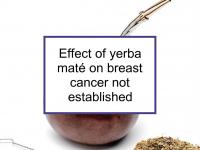Yerba maté (Ilex paraguariensis) is a South American tea which is a rich source of caffeine, caffeic acid, ferulic acid, theobromine, and numerous other bioactive compounds. Yerba maté and extracts of the plant have been shown to have remarkable antioxidant, antibacterial, stimulant, diuretic, anti-obesity and anticarcinogenic properties.
Yerba maté is a plant in the holly family whose leaves are steeped in hot water to make the beverage known as maté. Yerba maté extract has been shown to reduce the myocardial dysfunction provoked by ischemia and reperfusion by means of a reduction in oxidative damage. An extract of the tea has been shown to improve the cognition of laboratory rats and yerba maté is believed to enhance memory. One study found that postmenopausal women who consumed yerba maté tea daily for at least five years had higher bone mineral density compared with women who did not drink the tea.
Cancer-related effects of drinking yerba maté
In laboratory experiments, extracts of yerba maté have been shown to reduce DNA damage and the incidence of carcinogen-induced esophageal tumors, as well as inhibiting oral cancer cell proliferation. However, maté drinking has been shown to promote digestive tract cancers in several population studies. The tea has been shown to be associated with higher risks of cancers of the esophagus, oropharynx, larynx, lung, kidney, and bladder.
Although drinking any type of tea at a very high temperature increases the risk of esophageal cancer, the drinking of yerba maté at a very hot temperature does not explain all of the increased risks of cancers of the esophagus, oropharynx, and larynx. This is reason for concern.
Maté may have high levels of PAHs and cadmium
Maté contains relatively high levels of polycyclic aromatic hydrocarbons (PAHs). PAHs are chemicals formed during the incomplete burning of organic matter, including food. Women with high levels of PAH exposure, whether from diet or as a result of environmental factors, have been found to have higher risk of breast cancer than those with low exposure. Significant fractions of these compounds are released even if yerba maté leaves are infused with cold water instead of hot water.
A 2017 Brazilian study reported that more than two-thirds of 104 yerba maté samples from three Brazilian states incorporated unacceptably high levels of cadmium, a known breast carcinogen.
Maté drinking linked to lower breast cancer risk
A 2016 Uruguay study reported that women with relatively high maté consumption had significantly lower risk of breast cancer than women with low or no yerba mate intake. This was especially true for obese women. A 2020 Argentine study reported that consumption of yerba maté extract increased survival and reduced the number of lung metastases in an animal model of breast cancer.
Drinking maté could impede some chemotherapy
Maté could reduce the effectiveness of paclitaxel and other taxane chemotherapy as a result of its caffeic acid content.
Additional comments
Several herbal weight loss formulations and energy drinks containing yerba maté (possibly listed as Ilex paraguariensis or l. paraguariensis on the label) are available in the U.S. market and should also be avoided by those with breast cancer, breast cancer survivors or those known to be at high risk.
Given that high levels of herbicides, fungicides and pesticides often are used to produce yerba maté, organic is the best choice.
Few studies are available concerning this food and breast cancer. Below are links to recent studies.
